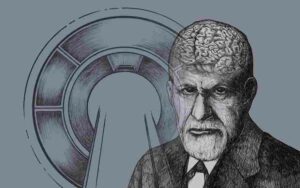Do you sometimes feel like you can’t control your thoughts or behaviors? If so, you may benefit from Freudian therapy. This type of therapy is based on the theories of Sigmund Freud, who believed that our unconscious minds are responsible for much of our behavior. In Freudian therapy, patients explore their unconscious minds to understand why they act and think the way they do. This can be a very helpful process for those who want to gain more control over their lives.
Contents
What Is Freudian Therapy?

Freudian therapy is a type of psychotherapy that was developed by Sigmund Freud.
It focuses on the unconscious mind and how it affects behavior. Freud believed that the unconscious mind is responsible for our thoughts, feelings, and behaviors.
What Are The Techniques Used In Freudian Therapy?

There are four main techniques used in Freudian therapy:
Free association
This is where the patient says whatever comes to mind, without censoring themselves. The therapist will then help them to interpret their thoughts and feelings. For example, a patient might say they feel “angry” and the therapist will help them to explore what might be causing that anger.
Dream analysis
Dreams can be seen as a way of understanding what is going on in the unconscious mind. The therapist will help the patient to interpret their dreams and understand what they mean. for example, a patient may dream that they are being chased by a lion. This could represent something that is causing them anxiety or fear in their life.
Free association
This is where the patient says whatever comes into their mind without censoring themselves. This can help to uncover buried thoughts and feelings that may be causing problems in their life. For example, a patient might say they feel angry when they think about their boss. This anger may be coming from a buried memory of being bullied by a previous boss.
Interpretation
The therapist will help the patient to understand the meaning of their thoughts and feelings. For example, they might interpret the anger towards the boss as being a result of unresolved feelings towards the patient’s father. For example, they might interpret the anger towards the boss as being a result of unresolved feelings towards the patient’s father.
Action
The therapist will encourage the patient to take action in their life to change their situation. This might involve assertiveness training, for instance, to help the patient stand up for themselves more at work. For example, a patient might be asked to keep a daily journal detailing their thoughts and feelings or to complete a task that is outside their comfort zone each week.
The therapist will also help the patient to understand how their past experiences are affecting their present life. This can be done by exploring family dynamics and early childhood memories in sessions.
Clarification
The therapist will help the patient to understand what they are feeling. For example, they might clarify that anger towards the boss is fear or insecurity.
The therapist will also help the patient to understand how their current thoughts and behaviors are impacting their life. They might explore how the patient’s perfectionism is causing them anxiety or how their anger is pushing people away.
Overall, the goal of Freudian therapy is to help the patient become more aware of their thoughts, feelings, and behaviors
Catharsis
The therapist will help the patient to release their emotions safely and healthily. This might involve crying, yelling, or anything else that will help the patient to let go of their emotions.
The therapist will also help the patient to understand how their emotions are impacting their life. They might explore how the patient’s anger is pushing people away or how their sadness is causing them to withdraw from life.
Overall, the goal of Freudian therapy is to help the patient become more aware of their emotions and how they are impacting their life.
Insight
The therapist will help the patient to gain insight into their thoughts and behaviors. They might explore how the patient’s perfectionism is causing them anxiety or how their anger is pushing people away. Once the patient has this insight, they can work on changing their thoughts and behaviors.
Action
Insight is only part of the equation, though. The therapist will also help the patient to take action. This might involve role-playing to practice assertiveness or exposure therapy to confront fears. The goal is for the patient to start making changes in their life that will reduce their distress.
Results
With time and effort, Freudian therapy can be very effective. Patients often find that their symptoms improve and they are better able to cope with stress. They might also develop healthier relationships and feel more satisfied with their lives.
Analysis of resistance
This is where the therapist tries to understand why the patient is resisting change or progress in therapy. The therapist will explore the patient’s feelings and emotions towards the therapist to understand how they relate to past relationships.
The therapist helps the patient to work through their issues by exploring the meaning behind their behaviors and thoughts.
Transference
This is where the patient projects their feelings onto the therapist. It can be a way of understanding unconscious feelings and conflicts. for example, a patient may feel anger towards their father and then transfer that feeling onto the therapist. For instance, a patient may feel anger towards their father and then transfer that feeling onto the therapist.
Freudian therapy aims to help the patient become aware of these projecting feelings and work through them. The therapist will often interpret what the patient is saying and doing to help them understand their feelings. This can be a difficult process, but it can be very helpful in dealing with difficult emotions.
How Can Freudian Therapy Help With?
There are many different types of therapy out there, and it can be tough to choose the right one for you. If you’re struggling with anxiety, depression, or other mental health issues, Freudian therapy may be a good option for you. Here’s what you need to know about this type of therapy and how it can help you.
Freudian therapy, also known as psychoanalysis, is a type of therapy that focuses on the unconscious mind. This type of therapy can help you to understand your thoughts and feelings, and how they’re affecting your behavior. It can help treat anxiety, depression, and other mental health issues.
If you’re considering Freudian therapy, it’s important to find a therapist who is trained in this type of therapy. This type of therapy can be beneficial, but it’s not right for everyone. If you’re not sure if it’s right for you, talk to your doctor or a mental health professional to learn more.
The 5 Main Idea Of Freudian Therapy

If you’re considering therapy, you may have heard of Freudian therapy and wondered what it is. Essentially, Freudian therapy is a type of talk therapy that focuses on the unconscious mind. Here are five main ideas of Freudian therapy:
- The first is that the unconscious mind influences our thoughts, feelings, and behaviors. This means that we may not be aware of the things that are driving our behavior.
- Second, Freud believed that early childhood experiences shape our adult lives. This is why understanding your childhood can be so important in therapy.
- Third, Freud believed that there are three parts to the personality: the id, ego, and superego. The id is the part of the personality that is driven by instinct and pleasure. The ego is the part of the personality that tries to balance the demands of the id with reality. The superego is the part of the personality that internalizes societal norms and values.
- Fourth, Freud believed in something called defense mechanisms. This is when the ego uses different techniques to protect itself from anxiety. For example, someone might use denial to avoid dealing with a difficult situation.
- Finally, Freud believed that psychosexual stages shape our adult lives. These are the stages of development we go through as we grow up: oral, anal, phallic, latency, and genital. Each step is marked by a different conflict that must be resolved.
If you’re considering therapy, understanding these five main ideas of Freudian therapy can help you decide if it’s right for you. Freudian therapy can be very helpful in exploring the unconscious mind and resolving childhood issues.
What Are The Goals Of Freudian Therapy?
The goals of Freudian therapy are to help people become more aware of their thoughts, feelings, and behaviors. For example, someone who is depressed may be helped by Freudian therapy to understand that their depression is caused by their thoughts and feelings.
This understanding can help the person to change their thinking and behavior, which can lead to a decrease in depression. For instance, someone who is anxious may be helped by Freudian therapy to understand that their anxiety is caused by their thoughts and feelings. This understanding can help the person to change their thinking and behavior, which can lead to a decrease in anxiety.
What Are The Benefits Of Freudian Therapy?
The benefits of Freudian therapy depend on the individual. However, some of the potential benefits include:
• Increased self-awareness: One of the goals of Freudian therapy is to help you become more aware of your thoughts, feelings, and behaviors. This can be a powerful tool for making changes in your life.
• Improved relationships: Another goal of Freudian therapy is to help you understand how your past experiences are affecting your current relationships. This can lead to more satisfying and supportive relationships.
• Resolving childhood issues: As mentioned above, Freud believed that our early childhood experiences shape our adult lives. By understanding and resolving these issues, you can live a more fulfilling life.
• Improved mental and emotional health: Freudian therapy can also help improve your overall mental and emotional health. This type of therapy can help manage anxiety, depression, and other mental health conditions.
If you’re considering Freudian therapy, it’s important to talk to a therapist about your goals for treatment. This will help you and your therapist decide if this type of therapy is right for you.
Concerns And Limitations
While Freudian therapy can be incredibly helpful for some people, it’s not without its concerns and limitations. One of the main concerns is that it often takes a long time to see results. This is because the therapist needs to help you slowly uncover your repressed memories and feelings. This process can be very painful and difficult, and it can take months or even years to see any real progress.
Another concern is that Freudian therapy relies heavily on the therapist’s interpretation of your dreams and memories. This means that the success of your therapy can depend a lot on how well your therapist understands you and is able to interpret your symbols and meanings. If your therapist is not experienced or skilled, it can be difficult to get the help you need.
Finally, Freudian therapy can be quite expensive. Because it often takes a long time to see results, you may end up paying a lot of money for therapy that doesn’t really help you.
If you’re considering Freudian therapy, it’s important to weigh the pros and cons carefully. It may not be right for everyone, but it can be a very effective form of treatment for some people. If you do decide to try Freudian therapy, make sure to find a qualified and experienced therapist who you feel comfortable with.
Conclusions
It may be concluded that Freudian therapy is an effective form of treatment for many mental health disorders. The theory behind Freudian therapy can be applied to a wide range of clinical situations, and the therapist can tailor the approach to each individual client. It can help people to understand and resolve their inner conflict, leading to greater self-awareness and insight. In addition, Freudian therapy can provide people with the tools to cope with stress and anxiety and to make positive changes in their lives.
For further information and suggestions, please contact Therapy Mantra. We have a team of expert therapists and psychiatrists that can help you overcome this problem. Get in touch with us right away to learn more about our services. You may also make an online therapy session or download our free Android or iOS app.


